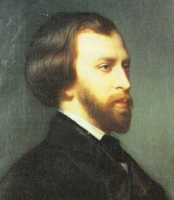| Alfred Louis Charles de Musset-Pathay | |||||||
| 阿爾弗雷德·德·繆塞 | |||||||
閱讀繆塞 Alfred de Musset在小说之家的作品!!! 閱讀繆塞 Alfred de Musset在诗海的作品!!! | |||||||
繆塞的文學活動是從參加以雨果為首的進步的浪漫主義團體“文社”開始的。他不僅是浪漫派中最有才華的詩人,其戲劇作品也大大促進了法國浪漫主義戲劇運動。他的小說在創建法國浪漫主義心理小說和為近代小說開闢道路上起的作用,也是值得註意的。
繆塞的詩歌真切動人。他的戲劇和小說儘管反映社會生活不夠全面,但是抒發個人情感,真實刻畫了法國某些階層的生活及心態,頗具時代色彩。特別是他描寫的“世紀病”在今天看來,還可以感覺到當時某些人物的精神面貌,他們的彷徨與苦悶。
他的主要戲劇作品有《羅倫紮西歐》、《反復無常的人》、《巴爾貝林》、《喀爾摩金》等。他的小說有《埃梅林》,《弗烈特立剋和貝爾納萊特》,《提善的兒子》,這三部小說可列入19世紀優秀愛情小說的行列。另一部《世紀兒懺悔錄》以其動人的愛情故事和細膩的心理描寫而成為繆塞的代表作。
阿爾弗裏·繆塞14歲開始寫詩,1829年出版第一本詩集《西班牙和意大利故事》19歲的繆塞因寫了《西班牙和意大利的故事》而嶄露頭角。這是一部充滿了荒唐故事的詩集。裏面有背信棄義,我們看到妻子欺騙丈夫,情婦戲棄情人,還有青春時期的欲望以及老年時期的腐化墮落。在這本詩集中,沒有成熟,沒有健康,衹有一種充滿青春活力的、熾熱沸騰的、令人難以置信的生命的強度。同時也有對古典主義的清規戒律的嬉笑怒駡。
阿爾弗裏·繆塞
1833年,長詩《羅拉》問世,序言的開始就是那著名的憧憬,憧憬往昔的哀悼,憧憬清新而美麗的古希臘,憧憬那具有純潔渴望和熾熱信仰的古代基督教世界。故事的主人公羅拉是巴黎這座放蕩的城市中最放蕩的青年,他輕視每件事,每個人,雖然並不富有,卻貪戀着驕奢淫逸的生活。他厭惡其他一切人,於是把父親遺留給他的錢分成3份,分別裝在3個袋子裏。第一袋可供他一年的生活費用,打算錢告罄後開槍自殺。這裏是繆塞式的自由:擺脫一切活動、一切職業、一切義務。最後作者描寫了羅拉在娼傢的自殺。作者順便也揭示了母親出賣女兒的勾當。繆塞在這部作品的所表現出的冷漠和目空一切的厭世態度與他的個性及他早期的經歷有關,在他青春的初期,繆塞對於人類的信心就已動搖不定了他曾經遭到一個情人的遺棄,一個朋友的背叛。這種上當受騙對他無疑是沉重的打擊。從此産生出來的是不信任感、刻毒和輕衊。
這部詩是繆塞詩歌創作的分水嶺,在這之前,繆塞的詩熱情明麗,想象豐富,充滿了活力和希望。從《羅拉》開始,繆塞的詩風發生了變化,他一反前期的那種樂觀精神,詩中開始流露出悲觀失望和迷茫不安的心情。這一年,繆塞結識了女作傢喬治·桑,從此開始了悲喜交加的感情歷程。這段愛情插麯對繆塞的人生和創作影響都極大,繆塞的重要詩篇基本上都是在這一時期寫成的,如抒情詩《四夜》、《露西》及《出版法》等。
阿爾弗裏·繆塞
1835至1841年寫成“四夜組詩”,抒發詩人失去愛情的復雜而豐富的感情,帶有悲觀色彩。他最著名的抒情詩是《四夜》,即《五月之夜》、《十二月之夜》、《八月之夜》和《十月之夜》。文學史傢們都把它們統稱為“四夜組詩”。組詩表達了詩人豐富而復雜的感情,從失戀的痛苦到對新生活的希望,從失意的孤獨到對慰藉的渴盼,種種感情交織在一起,唱出了凄婉動人的夜鶯之歌。《四夜》標志着繆塞抒情詩創作的最高峰,它以流暢優美的詩句呈現出詩人情感高漲時的原始狀態,真誠自然地體現了詩人內心深處的復雜感情。在形式上,除了《十二月之夜》以外,其餘三篇都采用詩人與繆斯對述的形式,或一問一答,或一唱一和,情感的表現十分細膩。《十二月之夜》則是詩人的獨白,詩人通過對自身幻影的反復詰問來渲染他的懺悔、迷茫和渴望之情,極富藝術魅力。《四夜》被列為法國浪漫派抒情詩的傑作。
1836年完成代表作自傳性長篇小說《一個世紀兒的懺悔》,描寫作者與法國女作傢喬治·桑的愛情糾葛,反映19世紀30年代法國青年知識分子的思想危機。另外也創作了許多短篇小說,國內曾翻譯出版過《繆塞短篇小說集》。還寫有詩劇《酒杯與嘴唇》、長詩《羅拉》、歷史劇《洛郎查丘》等,大都描繪對社會現實不滿而又找不到出路的個人主義者的悲劇。繆塞於1857年去世,年僅47歲。但早在十幾年前,他就幾乎不再創作了。後來在他墓碑上刻的是他的主要作品的名稱。
阿爾弗裏·繆塞 - 戲劇作品
阿爾弗裏·繆塞
《羅倫紮西歐》、《反復無常的人》、《巴爾貝林》、《喀爾摩金》等。他的小說有《埃梅林》、《弗烈特立剋和貝爾納萊特》、《提善的兒子》這三部小說可列入19世紀優秀愛情小說的行列。另一部《世紀兒懺悔錄》以其動人的愛情故事和細膩的心理描寫而成為繆塞的代表作。
《羅倫紮西歐》,羅倫紮西歐是亞歷山大這位縱欲的佛羅倫薩大公的堂弟。他天生一副純樸、敏感而精力充沛的性格。他少懷大志,决心要在世界上打倒暴君統治。為了達到這個目的,他扮演成一個全無心肝的浪子,當了亞歷山大的隨從,爪牙、出謀劃策者。為了減少疑心,他戴上一個軟弱、怯懦的肉欲主義者的假面具。然而,這多多少少倒有些棄假成真。於是,他恨透了自己。最後他唯有夢想着用暗殺大公這種單槍匹馬、偉大而果敢的行為來洗刷自己一生中的污泥濁水。而且詩人也讓他這樣把自己洗涮清白的。羅倫佐的性格表現為在可憎的假面具有其高貴性。在他的靈魂裏,有一種使他仰不愧於天、俯不作於人的理想因素。他滿懷希望,深信偉大行為的贖罪力量。
《反復無常的人》是這些小劇本中最精美的一篇。劇中的男子是一個輕佻的人,但裏面的婦女卻心地純正。巴黎女人德·雷利夫人既有教養又聰明伶俐。在她身上作者表現了純真、清新和自然風度。
在他後來的一些劇作中,繆塞都以歌頌女性的忠貞和純潔為主題。《巴爾貝林》取材於一個古老的傳說,描寫的是個理想的忠實妻子。《貝蒂娜》中的同名主人公卻是一個堅強、勇敢、心腸溫柔和精神高貴的婦女。短劇《喀爾摩金》也是表現堅貞、熱烈、虔誠的愛情。
阿爾弗裏·繆塞 - 小說作品
阿爾弗裏·繆塞
《埃梅林》,《弗烈特立剋和貝爾納萊特》,《提善的兒子》,這三部小說可列入19世紀優秀愛情小說的行列。
另一部《一個世紀兒的懺悔》以其動人的愛情故事和細膩的心理描寫而成為繆塞的代表作。
《埃梅林》這篇小說是繆塞第一次名符其實的戀愛的産物。一位青年和一位已婚的年輕貴婦陷入熱戀愛之中,卻沒有任何希望激發她對他的興趣,後來他終於贏得了她的愛情,她嚮他奉獻了自己。接着,他們突然永遠分別了。因為她太忠誠,不能欺騙自己的丈夫;而她的情人也由於感情太纖細而不可能再留在她的身旁。《一個世紀兒的懺悔》是自傳體小說。其中的皮埃鬆夫人就是喬治·桑這位貴婦人高度理想化的畫像。作者指出拿破侖帝國的崩潰和對拿破侖英雄主義的幻滅。他把這一切歸於“世紀病”産生的根源。
阿爾弗裏·繆塞 - 文學地位
繆塞的文學活動是從參加以雨果為首的進步的浪漫主義團體“文社”開始的。他不僅是浪漫派中最有才華的詩人,其戲劇作品也大大促進了法國浪漫主義戲劇運動。他的小說在創建法國浪漫主義心理小說和為近代小說開闢道路上起的作用,也是值得註意的。
繆塞的詩歌真切動人。他的戲劇和小說儘管反映社會生活不夠全面,但是抒發個人情感,真實刻畫了法國某些階層的生活及心態,頗具時代色彩。特別是他描寫的“世紀病”在今天看來,還可以感覺到當時某些人物的精神面貌,他們的彷徨與苦悶。
Musset was born on 11 December 1810 in Paris. His family was upper-class but poor and his father worked in various key government positions, but never gave his son any money. His mother was similarly accomplished, and her role as a society hostess, - for example her drawing-room parties, luncheons, and dinners, held in the Musset residence - left a lasting impression on young Alfred.
Early indications of Musset's boyhood talents were seen by his fondness for acting impromptu mini-plays based upon episodes from old romance stories he had read. Years later, elder brother Paul de Musset would preserve these, and many other details, for posterity, in a biography on his famous younger brother.
Alfred de Musset entered the collège Henri-IV at the age of nine, where in 1827 he won the Latin essay prize in the Concours général. With the help of Paul Foucher, Victor Hugo's brother-in-law, he began to attend, at the age of 17, the Cénacle, the literary salon of Charles Nodier at the Bibliothèque de l'Arsenal. After attempts at careers in medicine (which he gave up owing to a distaste for dissections), law, drawing, English and piano, he became one of the first Romantic writers, with his first collection of poems, Contes d'Espagne et d'Italie (1829, Tales of Spain and Italy). By the time he reached the age of 20, his rising literary fame was already accompanied by a sulphurous reputation fed by his dandy side.
He was the librarian of the French Ministry of the Interior under the July Monarchy. During this time he also involved himself in polemics during the Rhine crisis of 1840, caused by the French prime minister Adolphe Thiers, who as Minister of the Interior had been Musset's superior. Thiers had demanded that France should own the left bank of the Rhine (described as France's "natural boundary"), as it had under Napoleon, despite the territory's German population. These demands were rejected by German songs and poems, including Nikolaus Becker's Rheinlied, which contained the verse: "Sie sollen ihn nicht haben, den freien, deutschen Rhein..." (They shall not have it, the free, German Rhine). Musset answered to this with a poem of his own: "Nous l'avons eu, votre Rhin allemand" (We've had it, your German Rhine).
The tale of his celebrated love affair with George Sand, which lasted from 1833 to 1835, is told from his point of view in his autobiographical novel, La Confession d'un Enfant du Siècle (The Confession of a Child of the Age, made into a film, Children of the Century), and from her point of view in her Elle et lui. Musset's Nuits (1835–1837, Nights) trace his emotional upheaval of his love for George Sand, from early despair to final resignation. He is also believed to be the author of Gamiani, or Two Nights of Excess (1833), a lesbian erotic novel, also believed to be modeled on George Sand.
Tomb of Alfred de Musset in Père Lachaise Cemetery
Musset was dismissed from his post as librarian by the new minister Ledru-Rollin after the revolution of 1848. He was however appointed librarian of the Ministry of Public Instruction in 1853.
Musset received the Légion d'honneur on 24 April 1845, at the same time as Balzac, and was elected to the Académie française in 1852 (after two failures to do so in 1848 and 1850).
Alfred de Musset died in his sleep on 2 May 1857. The cause was heart failure, the combination of alcoholism and a longstanding aortic insufficiency. One symptom that had been noticed by his brother was a bobbing of the head as a result of the amplification of the pulse; this was later called Musset's sign. He was buried in Père Lachaise Cemetery in Paris.
Reception
The French poet Arthur Rimbaud was highly critical of Musset's work. Rimbaud wrote in his Letters of a Seer (Lettres du Voyant) that Musset did not accomplish anything because he "closed his eyes" before the visions. (Lettre à Paul Demeny, mai 1871)
Director Jean Renoir's La règle du jeu was inspired by Musset's play, Les Caprices de Marianne.
Henri Gervex's 1878 painting Rolla was based on a poem by de Musset. It was rejected by the jury of the Salon de Paris for immorality, since it depicted a scene from the poem of a naked prostitute after having sex with her client - but the controversy helped Gervex's career.
Music
Lorenzaccio, which takes place in Medici's Florence, was set to music by the musician Sylvano Bussotti in 1972.
Works
Poetry
Contes d'Espagne et d'Italie, 1829
Un Spectacle dans un fauteuil, 1832
Poésies complètes, 1840
Poésies nouvelles, 1850
Les Nuits (Nuits de mai, d'août, d'octobre, de décembre), 1835–1837
Œuvres posthumes, 1860
Plays
La Nuit vénitienne, 1830
a failure; from this point until 1847, his plays were published but not performed
André del Sarto, 1833
Les Caprices de Marianne, 1833
Lorenzaccio, 1833
Fantasio, 1834
On ne badine pas avec l'amour, 1834
La Quenouille de Barberine, 1835
Le Chandelier, 1835
Il ne faut jurer de rien, 1836
Un Caprice, 1837
first performed in 1847, and a huge success, leading to the performance of other plays
Il faut qu'une porte soit ouverte ou fermée, 1845
On ne saurait penser à tout, 1849
Carmosine, 1850
Bettine, 1851
L'Âne et le Ruisseau, 1855
Novels
La Confession d'un enfant du siècle (The Confession of a Child of the Century, autobiographical), 1836.
Histoire d'un merle blanc (The White Blackbird), 1842.
Secondary Literature
Henri Lefebvre, Musset, 1955
Mimi Pinson
